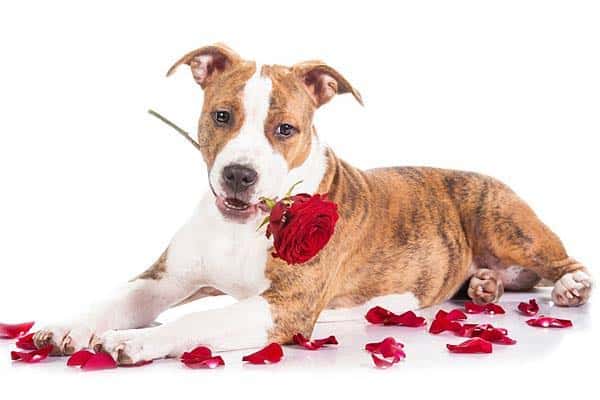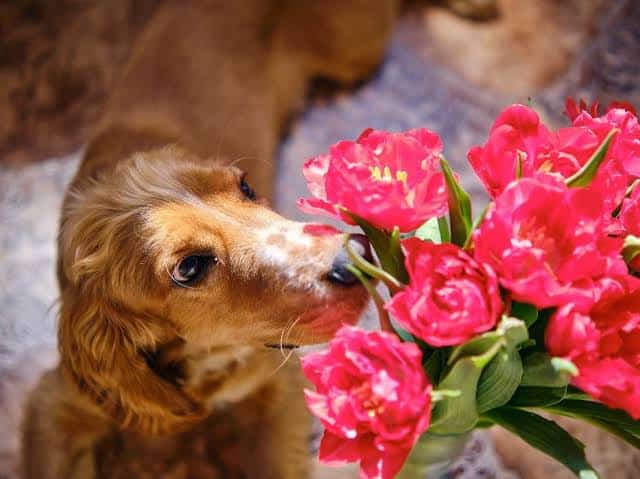Our focus in this article is to answer the question “Are Carnations Toxic To Dogs?”. Other subtopics we will discuss include; Carnations And Their Potential Toxicity For Dogs, Are All Parts Of The Carnation Plant Harmful To Dogs?, Symptoms Of Carnation Poisoning In Dogs, Treating Carnation Toxicity In Dogs, etc.
If you’re a dog owner, you probably worry about what your furry friend gets into. From chocolate to houseplants, there are plenty of things that can be toxic to dogs. But what about flowers? Specifically, are carnations toxic to dogs? In this blog, we’ll dive into the topic of carnations toxicity to dogs and provide all the information you need to keep your pup safe. So, pet parents, let’s get started!
See Also: Are Lilies Toxic to Dogs?: Find out How it Affects Them
Carnations And Their Potential Toxicity For Dogs
Alright, dog lovers, listen up! We need to talk about something serious – carnations and their potential toxicity for our furry friends. Now, we all know that dogs are curious little creatures who love to sniff and explore everything in their path. But did you know that those beautiful carnations you have sitting on your table could actually be harmful to your four-legged pals?
You see, carnations contain certain compounds that can be toxic to dogs if ingested. These compounds can cause symptoms like vomiting, diarrhea, excessive drooling, and even difficulty breathing. And let me tell you, nobody wants to see their precious pup going through that.
But don’t worry, there are some simple steps you can take to keep your furry friend safe. Firstly, make sure to keep carnations out of reach. Put them on a high shelf or in a room that your dog doesn’t have access to. If you’re arranging flowers, be extra careful not to drop any petals or leaves on the ground where your pup could find them.
Secondly, if you suspect that your dog has ingested any part of a carnation, it’s important to contact your vet right away. They’ll be able to give you the best advice on what to do next and whether or not your dog needs to be seen.
Look, we all love our dogs and want to keep them safe. So let’s take this carnation issue seriously and do everything we can to prevent any accidents. After all, our furry friends deserve nothing but the best, right?

Are All Parts Of The Carnation Plant Harmful To Dogs?
So, you have a fluffy little friend at home and you’re wondering if all parts of the carnation plant are harmful to dogs? Well, let us break it down for you. While carnations are beautiful and colorful flowers, some parts of the plant can actually be harmful to dogs if ingested.
The leaves, stem, and flowers of the carnation plant contain certain compounds that can cause digestive issues for dogs. If your pup decides to chow down on some carnation leaves, it could lead to symptoms like vomiting, diarrhea, and even upset stomach. And let’s face it, nobody wants to deal with a sick doggy.
But don’t worry, it’s not all doom and gloom. The good news is that the carnation plant is not considered highly toxic to dogs. In most cases, if your dog happens to nibble on a few petals or leaves, they will likely just experience some mild stomach upset and will be back to their usual mischievous selves in no time.
However, it’s always better to be safe than sorry, especially when it comes to our furry companions. If you catch your dog snacking on carnation plants, it’s best to monitor them closely for any signs of illness. If they start showing severe symptoms or if you’re unsure of what they ingested, it’s always a good idea to contact your veterinarian for further guidance.
So, to sum it up – while not all parts of the carnation plant are harmful to dogs, it’s still important to keep an eye on your canine friend if they decide to have a little snack. And as always, consult with your vet if you have any concerns or questions about your dog’s health.
See Also: List of Dog Safe Flowers
Symptoms Of Carnation Poisoning In Dogs
We all know how much our furry friends love to sniff and explore everything around them, including flowers. But did you know that some flowers, like carnations, can be really dangerous for dogs?
If your dog has ingested carnations, there are a few symptoms you should look out for. The first and most obvious is vomiting. If you notice your pup throwing up after being around carnations, it’s a good sign that something is wrong. They might also have diarrhea, which can be really messy and unpleasant for both you and your dog.
Another symptom to watch out for is excessive drooling. If you notice your dog’s mouth becoming excessively wet and drooly, it could be a sign of carnation poisoning. They might also start to experience difficulty breathing, which is a pretty serious symptom. If you notice your dog struggling to catch their breath, you should seek immediate veterinary attention.
In some cases, dogs who have ingested carnations may also experience tremors or seizures. If you notice your dog shaking uncontrollably or having a seizure, it’s important to get them to the vet as soon as possible.
See Also: List of Dog Toxic Flowers

Treating Carnation Toxicity In Dogs
Identifying Carnation Toxicity Symptoms
Recognizing the signs of carnation toxicity is the first step in providing prompt care. Our guide outlines common symptoms such as vomiting, diarrhea, lethargy, and loss of appetite, helping you quickly assess if your dog may have ingested a toxic substance.
Immediate Steps To Take
In case of suspected carnation toxicity, time is of the essence. Our veterinarians advise on immediate steps to take, including inducing vomiting (if safe and recommended by a professional), contacting your veterinarian, and providing supportive care until professional help is available.
The Role Of Professional Veterinary Care
Learn why seeking professional veterinary care is crucial in cases of plant toxicity. Our experts emphasize the importance of professional assessment, which may include diagnostic tests, supportive therapies, and specific treatments tailored to your dog’s condition.
Home Remedies And First Aid
Explore safe and effective home remedies that can be administered while waiting for veterinary assistance. From activated charcoal to supportive care measures, our guide offers insights into how you can provide initial aid to your dog.

See Also: Best Food for Dogs with Allergies
Preventing Carnation Poisoning In Dogs
As responsible dog owners, it’s crucial to be proactive in creating a safe environment for our furry companions. Kindly go through this section to avoid carnation poisoning in dogs.
Know Your Flowers
Start by familiarizing yourself with the plants in your home and surroundings. Our guide provides information on identifying carnations and other potentially toxic flowers, empowering you to make informed decisions about which floral arrangements are safe for your dog.
Pet-Friendly Floral Choices
Discover a variety of pet-friendly flowers that can add beauty to your space without posing a risk to your dog. Our experts recommend alternatives like roses, sunflowers, or pet-safe ferns, ensuring you can enjoy a vibrant atmosphere while keeping your pup safe.
Safe Placement Of Plants
Explore strategic placement options for plants, ensuring they are out of reach for your curious canine companions. Our guide provides tips on elevated surfaces, hanging baskets, and other creative solutions to prevent dogs from accessing potentially harmful flowers like carnations.
Educate Your Household
Ensure everyone in your household is aware of the potential dangers associated with certain plants. Educate family members, guests, and anyone interacting with your dog about the importance of keeping flowers like carnations away from your furry friend.
Supervision And Training
Supervise your dog’s interactions with plants and implement training to discourage them from exploring potentially harmful areas. Positive reinforcement techniques can help create a safe and enjoyable environment for both you and your pup.
Regular Health Checkups
Regular veterinary checkups are essential for preventive care. During these visits, discuss your dog’s environment, any potential exposure to toxic plants, and seek advice on maintaining a pet-safe space.
Emergency Preparedness
Be prepared for emergencies by having the contact information for your veterinarian, a local emergency pet poison hotline, and the ASPCA Animal Poison Control Center readily available. Quick access to these resources can be crucial in case of accidental exposure.

See Also: 5 Toxic Foods To Avoid For Dogs
Safe Alternatives To Carnations For Dog Owners
Below are safe alternatives to carnations, which ensures that your furry friend can enjoy a blossoming space without any worries.
Roses
Roses, with their timeless beauty, are not only classic but also safe for dogs. Explore the various colors and types of roses that can add a touch of elegance to your home without posing any harm to your furry companion.
Sunflowers
Bring a burst of sunshine indoors with sunflowers, known for their cheerful demeanor. Learn about these vibrant blooms and how they can elevate your home’s atmosphere while being entirely safe for your dog.
Pet-Friendly Ferns
Discover the world of pet-friendly ferns, offering lush greenery without any worries. Dive into different fern varieties that not only enhance your decor but also create a pet-safe and stylish space.
Orchids
Embrace exotic elegance with orchids, a pet-safe choice that adds sophistication to any setting. Uncover the various orchid varieties that not only captivate with their beauty but also ensure the safety of your dog.
Marigolds
Explore the vibrant hues of marigolds, a non-toxic flower that can bring a pop of color to your space. Dive into different marigold varieties and understand how they can be a lively and safe alternative for dog owners.
See Also: Best Food for Dogs with Allergies
Conclusion
In unraveling the mystery of whether carnations are toxic to dogs, we’ve navigated through the complexities of floral safety for our furry companions. While carnations themselves are generally considered non-toxic to dogs, it’s crucial to be aware of potential risks associated with certain factors.
This doesn’t mean we should let our guard down. Additives in floral arrangements, pesticides, or other flower varieties could pose risks to our canine friends. Vigilance is key, and if you suspect your dog has ingested any part of a carnation or is displaying unusual behavior, seeking prompt veterinary advice is essential.
